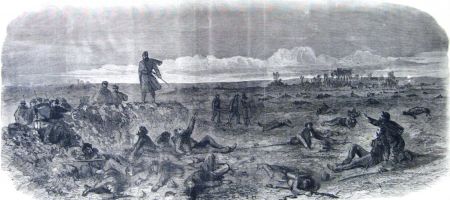
The Battle of Monocacy: Demerest’s New-York Illustrated News, July 30, 1864, Courtesy of Princeton University Library
Today Confederate Lieutenant General Jubal A. Early’s 14,000-strong force is en route to what is to be a bold, and hopefully surprise, invasion of Washington, D.C. Fortunately for the Union, the Rebels are intercepted east of Frederick, Maryland by a Union force led by Major General Lew Wallace and numbering about 5,800. The clash becomes known as the Battle of Monocacy.
Vastly outnumbered, the Federals nonetheless put up a spirited fight. Despite losing the battle, the Federals’ action delays the advance of the Confederates, allowing Union General Ulysses S. Grant to rush reinforcements toward Washington, D.C.
Two days from hence Early reaches the outskirts of the Confederate capital on the same day that Union reinforcements unload from transport ships. Early realizes he has arrived too late. The beefed up defense of the city forces the Rebels to turn around, sparing Washington from a Confederate assault. The Battle of Monocacy thus becomes known as the “battle that saved Washington.”
Fighting in the battle is Captain Martin J. Chamberlain of Company F, 106 Regiment, New York Volunteers. Martin is a member of the First Baptist Church Massena, New York, one of several church members who serve in the Union Army. Upon his departure from Massena, the congregation had held a farewell service in Chamberlain’s honor, a service that included a flag presentation.
Today, however, Chamberlain is seriously wounded. Transferred to a Union hospital in Frederick, Chamberlain dies from his wounds. His body is eventually returned to his home town, where a funeral service and burial occur.
Chamberlain’s story, while tragic, is routine. As on many days during the war, hundreds of Baptists, North and South combined, are likely killed this day on various battlefields. The bodies that are identified are, in due time, sent homeward, where funerals and burials are held. Wives, mothers, children and siblings weep, the consolation of fellow church members genuine yet unable to fill the hole left in the hearts of surviving family members, whose lives are forever altered by the violence of war visited upon them from afar.
Sources: Battle of Monocacy (link) and (link); “Crossroads of War: Maryland and the Border in the Civil War,” including image (link); “First Baptist Church Demolished Wednesday Built in 1859, Origins Date to 1825,” North County Now News, December 13, 2012 (link)


